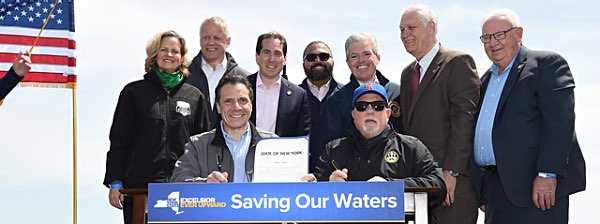- By New York State Governor’s Office
- News
 Print
Print  Governor Cuomo, Joined by Billy Joel, Signs Bill to Ban Offshore Drilling in New York Waters
Governor Cuomo, Joined by Billy Joel, Signs Bill to Ban Offshore Drilling in New York WatersGovernor Andrew M. Cuomo, joined by Billy Joel, signed legislation (S.2316 (Kaminsky)/A.2572 (Englebright)) Monday to ban offshore drilling in New York State waters. The legislation will bar the state from granting permits for drilling, or oil or gas exploration in offshore areas controlled by the State. The ban will protect New York's waters and coasts by making it more difficult for oil and gas drilling to occur close to coastal New York, even in waters controlled by the federal government. In addition, the legislation prohibits the leasing of State-owned underwater coastal land that would authorize or facilitate the exploration, development, or production of oil or natural gas. The Governor signed the bill in direct response to the Trump administration proposal to open U.S. coastal areas to drilling.
"This bill says no way are you going to drill off the coast of Long Island and New York, because we must lead the way as an alternative to what this federal government is doing," Cuomo said. "Today is about making sure Jones Beach and all of the coastal communities are here for our children and for the next generation. We must make sure we leave this world a better place for them because our job as parents, as citizens, as human beings is to pass it on better than you found it."
In 2017, the federal government proposed a new National Outer Continental Shelf Oil and Gas Leasing Program for 2019-2024, which would open more than 90 percent of the country's offshore waters to oil and gas drilling. For the first time in decades, the new federal plan would open up vast areas of the Atlantic Ocean for possible fossil fuel exploration and drilling, putting New York's coast at direct risk of significant environmental damage.
An exclusion from offshore drilling was granted to Florida shortly after its launch on the grounds that the state relies heavily on tourism as one of the nation's top ocean economies. However, as the number three ocean economy in the nation, New York has not been granted this same exclusion, and stands to lose nearly 320,000 jobs and billions of dollars generated through tourism and fishing industries should the exclusion not be granted. Overall, New York's ocean economy generates $11 billion in wages and contributes $23 billion in gross domestic product. Long Island and the New York Harbor are home to 11.4 million people, with 60 percent of the State's population living along nearly 2,000 miles of tidal coastline.
Additionally, the Port of NYNJ—the largest on the Atlantic seaboard—would be devastated by any major spill related to offshore drilling, disrupting operations and impacting the national economy. The Port supports 400,000 indirect jobs and 229,000 direct jobs while generating $90 billion in combined personal and business income and $8.5 billion in federal, state, and local taxes.
Secretary of State Rossana Rosado said, "New York stands united against the threats oil and gas activity pose and Cuomo has once again shown his commitment to protecting the healthy ocean environment that our coastal communities and economy rely on. This is a critical battle in our State's continued push to transform our energy future, fight climate change, and protect our state from reckless exploitation."
In March 2019, the U.S. Commerce Department's National Oceanic and Atmospheric Administration asked the public to weigh in on ways to "streamline" a state review process granted under the Coastal Zone Management Act, which is one of the most powerful tools states have to regulate activity off their coasts. At the direction of Cuomo, Department of State filed comments that urge the federal government to abandon any attempt to weaken or undermine state authority needed to protect our vital coastal economy.
While the Secretary of the Interior David Bernhardt recently expressed uncertainty about whether the administration's drilling plan will go forward, New York and other coastal states are maintaining pressure and remaining vigilant in their opposition. Several other state legislatures have taken legislative action to block the proposed expansion of federal oil and gas leasing off their shores. Connecticut, Florida, Georgia, Hawaii, Maine, Massachusetts, New Hampshire, Rhode Island, and South Carolina have introduced bills or resolutions aimed at preventing offshore drilling on their coastal waters. California, Delaware, Maryland, New Jersey, and Oregon have successfully enacted laws.
v15i17



